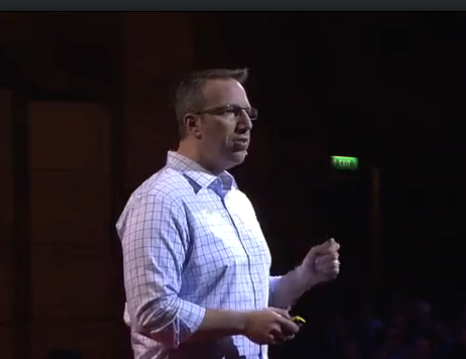We consistently underestimate what criminals and terrorists can do.
我們一直低估了罪犯和恐怖分子能做到的事情。
Technology has made our world increasingly open, and for the most part, that's great, but all of this openness may have unintended consequences.
科技已經讓我們的世界越來越開放。當然,在大多數情況下,這是好事,但是這個開放性也可能會造成始料未及的后果。
Consider the 2008 terrorist attack on Mumbai. The men that carried that attack out were armed with AK-47s, explosives and hand grenades.
想想看2008年發生在孟買的恐怖襲擊吧。那些實施了那次恐怖襲擊的人都裝備著AK-47s,炸藥和手榴彈。
They threw these hand grenades at innocent people as they sat eating in cafes and waited to catch trains on their way home from work.
他們把這些手榴彈投向了那些正在咖啡館里就餐和下班后正在等著趕火車回家的無辜的平民。
But heavy artillery is nothing new in terrorist operations. Guns and bombs are nothing new.
但是在恐怖活動當中,重型火炮早已屢見不鮮。槍支和炸彈更是毫無新意了。
What was different this time is the way that the terrorists used modern information communications technologies to locate additional victims and slaughter them.
這次恐怖襲擊的特殊之處在于,恐怖分子利用現代信息通信技術,查明額外的受害者的身份并且屠殺他們的方式。
They were armed with mobile phones. They had BlackBerries. They had access to satellite imagery.
這些襲擊者配備了移動電話。他們擁有黑莓手機。他們可以使用衛星地圖。
They had satellite phones, and they even had night vision goggles. But perhaps their greatest innovation was this.
他們擁有衛星電話,甚至夜視眼鏡。但是他們最大的創新之處也許是這個:
We've all seen pictures like this on television and in the news. This is an operations center.
我們都在電視上或者新聞里看到過像這樣的圖片。這是一個操控中心。
And the terrorists built their very own op center across the border in Pakistan, where they monitored the BBC, al Jazeera, CNN and Indian local stations.
這些恐怖分子建立了完全屬于他們自己的,跨越巴基斯坦邊境的操控中心,在那里,他們可以監控英國廣播公司,半島電視臺,美國有線電視,以及印度當地的地方電臺。
They also monitored the Internet and social media to monitor the progress of their attacks and how many people they had killed. They did all of this in real time.
他們還可以通過監測網絡和社會化媒體來監控他們的襲擊的進展,以及他們已經屠殺了多少人,他們實時進行著一切行動。
The innovation of the terrorist operations center gave terrorists unparalleled situational awareness
恐怖分子在操控中心上的創新,為他們提供了前所未有的現場情景感知
and tactical advantage over the police and over the government. What did they do with this? They used it to great effect.
以及遠勝過警察和政府的戰術優勢,他們利用它做了什么呢?他們利用它發揮了重大的作用。

At one point during the 60-hour siege, the terrorists were going room to room trying to find additional victims.
在60個小時的恐怖襲擊過程中,這些恐怖分子曾一度闖入一間又一間的房間,試圖尋找更多的受害者。
They came upon a suite on the top floor of the hotel, and they kicked down the door and they found a man hiding by his bed.
他們在酒店的頂層偶然發現一間套房,接著他們踢開了房門,而且找到了一個正躲在床邊的男人。
And they said to him, "Who are you, and what are you doing here?" And the man replied, "I'm just an innocent schoolteacher."
他們問這個男人:“你是誰,你在這里干什么?”這個男人回答道:“我只是一名無辜的學校老師?!?/div>
Of course, the terrorists knew that no Indian schoolteacher stays at a suite in the Taj.
當然,這些恐怖分子非常清楚,印度的學校老師不可能住得起泰姬瑪哈酒店的套房。
They picked up his identification, and they phoned his name in to the terrorist war room,
他們撿起了他的身份證件,并且打電話將他的名字告知了恐怖活動操控中心,
where the terrorist war room Googled him, and found a picture and called their operatives on the ground and said, "Your hostage, is he heavyset?
而操控中心的恐怖分子在谷歌上搜索了他的名字,找到了一張照片,然后把電話打回給在套房現場的恐怖分子,并且問他們:你們的人質是不是身材壯碩?
Is he bald in front? Does he wear glasses?" "Yes, yes, yes," came the answers.
他的前額是不是禿頂?他是不是戴著眼鏡?”“沒錯!”現場的恐怖分子回答道。
The op center had found him and they had a match. He was not a schoolteacher.
操控中心找到了他,并且對他的身份進行了匹配確認。他的確不是學校老師。
He was the second-wealthiest businessman in India, and after discovering this information, the terrorist war room gave the order to the terrorists on the ground in Mumbai. ("Kill him.")
事實上,他是印度財富排名第二的商人,而在發現了這一信息之后,操控中心給孟買現場的恐怖分子下了一道命令。(“殺了他?!保?/p>











